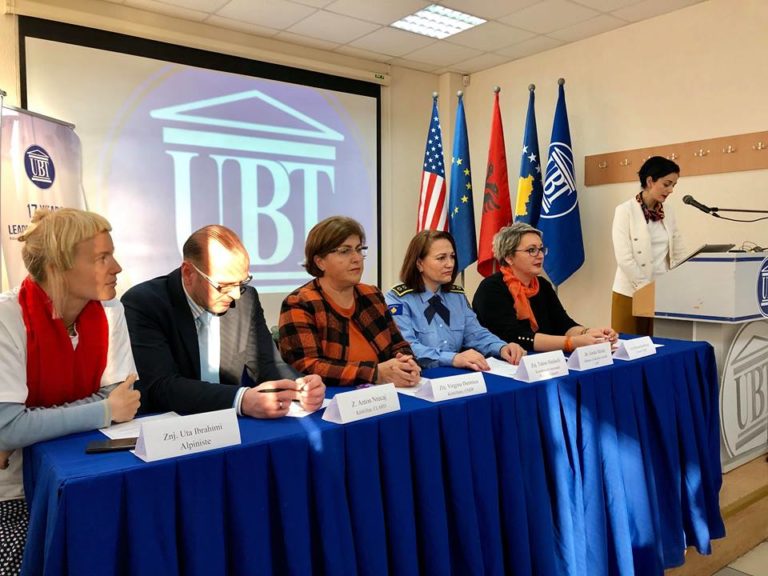
UBT appeals for eradication of gender-based violence
11/12/2018Domestic violence is one the most widespread phenomena in global level, and particularly in Albanian speaking countries the gender-based violence is a highly concerning issue which brings forth numerous adverse effect regarding the psychological, physical and economic aspects of those marginalized groups. Predominantly, women are the most common subject to this violence by 95%.
In Kosovo there has been a large number of sues and proceedings related regarding the cases of domestic violence with an overall number of 1200. The vast majority of the individuals which are affected by the domestic violence are women, whereas only 12 men are victims of domestic violence.
Those statistics were elaborated during the discussion regarding the topic, “Creating women and other marginalized groups with the opportunity of having a better access to justice”. This discussion was held in the framework of the activity regarding the issue of human rights, where the UBT students initiated a campaign called, “16 Days activism against the Gender-Based Violence”.
Dr. Jorida Xhafaj, dean of the Faculty of Law, emphasized that this sort of activism represents in itself a major step in countering this phenomena, and that gender-based violence has mainly affected women, owing to the improper mentality that has been profoundly rooted for centuries. Due to the fact, this hampers a right implementation of law.
“Frequently, coping with a certain mentality as well as social concepts comprise in itself a major hardship, which hampers the functionalizing of mechanisms foreseen by law. UNDP is among the most renowned international bodies, and as a matter of a fact it is carrying a out ceaseless efforts to permanently eradicate violence in Kosovo as well as other countries. This activity in itself is a reflection of this work”, underlined Xhafaj.
Virgjina Dumnica who is actually a council at UBT highlighted that domestic violence does not only represent in itself the violence against women, but there are highly predisposed and affected by this evil phenomena.
“16 Days of Activism”, aims at preventing the gender-based violence and aiding the victims which have been affected by this phenomena. This activity will also contribute to aid the local and institutions and civil society in their struggles to counter violence”, stated Dumnica.
“Despite of the fact that the activity is organized in global level, its main focus is on Kosovo owing to the fact that these phenomena pose a threat to women, particularly in our country”, said the official for Gender Equality from UNDP, Brikena Hinterberger.
“UNDP is continuously working to counter this and other negative phenomena which slowdown the development of society. Besides that we are regularly collaborating with the vast majority of institutional actors and their respective institutions which aim at countering those phenomena”, said Hinterberger.
In addition, Hinterberger also appealed for denouncing the violence by all means, otherwise it may have aggravating experiences which results in tragedy.
The legal advisor in the “CLARK” NGO, Anton Nrecaj pointed out the importance of providing free of charge judicial services with a special focus on marginalized groups.
“Since many years ago, our organization has been regularly providing free of charge legal services, because not everyone is able to pay a lawyer. The vast majority of those citizens are mainly part of the marginalized groups. The activity has been fruitful and has met our expectations, and as a result we have managed to change the legal framework concerned with domestic violence”, stated Nrecaj.
Due to the fact, Nrecaj also mentioned the case of domestic violence which resulted in tragedy, the murder of Diana Kastrati who was killed from her former husband. The Constitutional Court blamed the state for failing to defend the victim.
The National Police Coordinator of the Kosovo Police, Tahire Haxholli, availed from the occasion to reveal a wide range of facts and statistics which explain the consequences coming from violence. In addition, she also pointed out the reasons which foster the victims to withdraw their sues. Moreover, she said that 95% of the victims of this violence are women and encouraged the participants of this activity to denounce violence in whatsoever circumstances.
The state has established a legal and institutional infrastructure, aiming to defend the victims and bring the criminal offender of the wrongdoer in front of justice.
Haxholli underlined that this success is impossible to be attained, if there is lack of collaboration between citizens. Consequently, she encouraged the participants to inform the police if they have evidence concerning violence, underlined Haxholli.
The alpinist Uta Ibrahimi shared her personal experience regarding the issue of gender inequality. Due to the fact, she talked about her extraordinary and challenging experience of climbing the Everest. However, to attain this success she had to cope with numerous obstacles and gender-based bias.
Climbing Everest was a significant event and has definitely persuaded me that it’s worth countering the existing gender inequality in Kosovo, which she suffered from by being refused from the Kosovo team which was planning to climb Everest.
Moreover, she advised the youngsters to collaborate with each and struggle for changing the existing mentality because the violence against women it is not only violence against them but a threat for the society as a whole.
The discussion ended by the questions that the students, lecturers and journalists related to the collaboration between media and police. The denouncing of the respective cases leads to reduction of violence and creates the Kosovo’s Police the opportunity of working more. Nonetheless this will also increase the trust among of citizens for this institution.